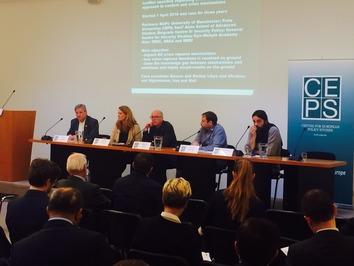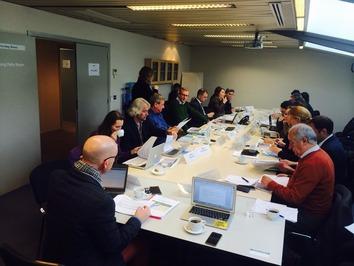EUNPACK/Horizon 2020: Good intentions, mixed results – A conflict sensitive unpacking of the EU comprehensive approach to conflict and crisis mechanisms
European Commission’s Horizon2020 grant scheme

From left to right: Associate Professor Dr. Ingo Peters, Research Fellow Enver Ferhatovic, Student Associates Rabea Heinemann, Sofia Sturm, Susan Bergner
Object of Research
FU Berlin/Otto Suhr Institute of Political Science/Center for Transnational Relations, Foreign and Security Policy (ATASP) is thrilled to announce that beginning of April 2016 it started its engagement on the academic consortium project titled “Good intentions, mixed results – A conflict sensitive unpacking of the EU comprehensive approach to conflict and crisis mechanisms (EUNPACK)” which is financed by European Commission’s Horizon2020 grant scheme. The EUNPACK consortium’s focus is to unpack EU crisis response mechanisms, with the aim to increase EU conflict sensitivity and effectiveness. By combining bottom–up perspectives with an institutional approach, EUNPACK will aim to increase the understanding of how EU crisis responses function and are received on the ground in crisis areas.


This entails exploring local agencies and perceptions in target countries without losing sight of the EU’s institutions and their expectations and ambitions. It also entails examining the whole cycle of crisis, from pre-crisis, through crisis, and into post crisis phase. EUNPACK analyses two gaps in EU crisis response:
- the intentions–implementation gap (the capacity to make decisions and respond with one voice and to deploy the necessary resources; how these responses are implemented on the ground by various EU institutions and member states, and how other actors – local and international – enhance or undermine the EU’s activities).
- the gap between the implementation of EU policies and approaches, and how these policies and approaches are received and perceived in target countries
The premise on which the consortium bases its work is that the severity of the two gaps is a decisive factor for the EU impact on crisis management and thereby its ability to contribute effectively to problem-solving on the ground. The consortium will analyze these gaps through cases that reflect the variation of EU crisis responses in three concentric areas surrounding the EU: the enlargement area (Kosovo, Serbia), the neighborhood area (Ukraine, Libya), and the extended neighborhood (Mali, Iraq, Afghanistan). The results of EUNPACK research will serve as policy recommendations fine-tuned to making the EU’s crisis response mechanisms more conflict and context sensitive, and thereby more efficient and sustainable. EUNPACK is a three years project and will cover the period from April 2016 until 2019.
The EUNPACK Project Team at FU Berlin/Otto Suhr Institute of Political Science/Center for Transnational Relations, Foreign and Security Policy (ATASP) consists of Associate Professor Dr. Ingo Peters, Research Fellow Enver Ferhatovic and Student Associate Adam Riviera, Stefan Wiechmann will have the lead on the extended neighborhood area research and substantially support research on EU crisis-management institutions and policies as well as the conceptual and analytical framework for the overall project.
Publications
- The European Union’s Crisis Response in the Extended Neighbourhood: The EU’s Output Effectiveness in the Case of Iraq
- The European Union’s Crisis Response in the Extended Neighbourhood: The EU’s Output Effectiveness in the Case of Afghanistan
- The European Union’s Crisis Response in the Extended Neighbourhood: Comparing the EU’s Output Effectiveness in the Cases of Afghanistan, Iraq and Mali
- Lessons to be learned from the EU Crisis Response in the Extended Neighbourhood: EU Security Sector Reform in Afghanistan, Iraq and Mali
Project participants
Norwegian Institute of International Affairs [NUPI] (coordinator), Norway
School of Social Science, University of Manchester [UMan], UK
Centre for Transnational Studies, Foreign – and Security Policy, Freie Universität, Berlin [Freie], Germany
Centre for European Policy Studies [CEPS], Belgium
Department of Political Science, Faculty of Arts, Comenius University [Comenius], Slovakia
Sant’ Anna School of Advanced Studies [SSSA], Italy
Belgrade Centre for Security Policy [BCSP] – Local partner in the enlargement area, Serbia
Kosovar Centre for Security Studies [KCSS] – Local partner in the enlargement area, Kosovo
Jean Monnet Centre of Excellence in European Studies, Kyiv-Mohyla Academy [JMCK] – Local partner in EU’s Eastern neighbourhood, Ukraine
Institut de Recherche sur le Maghreb Contemporain [IRMC] – Local partner in EU’s Southern neighbourhood, Tunisia
Alliance for Rebuilding Governance in Africa [ARGA] – Local partner in EU’s extended neighbourhood, Mali
Afghanistan Research and Evaluation Unit [AREU] – Local partner in EU’s extended neighbourhood, Afghanistan
Middle East Research Institute [MERI] – Local partner in EU’s extended neighbourhood, Iraq
For more information visit:http://www.nupi.no/en/News/Unpacking-EU-crisis-response

